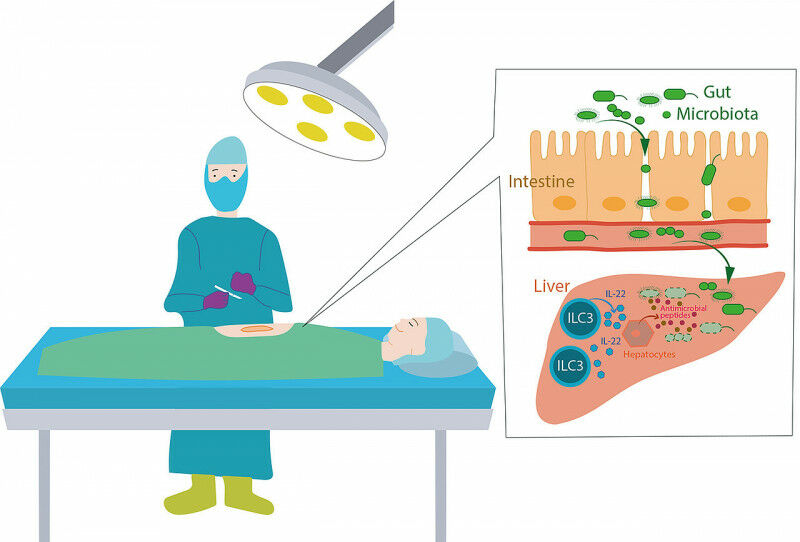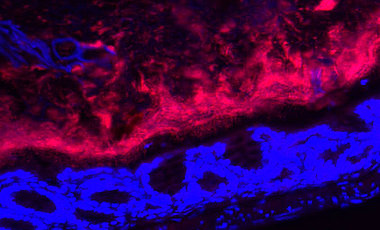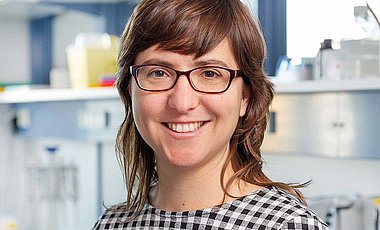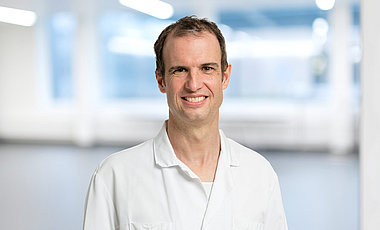博文
来自内脏的攻击
||
来自内脏的攻击
诸平

据德国维尔茨堡大学(University of Würzburg / Julius-Maximilians-Universität Würzburg)2023年3月23日报道,来自内脏的攻击(Attack from the gut)。
德国维尔茨堡(Würzburg)和瑞士伯尔尼(Bern)的研究团队的一项新研究表明,肠道细菌通常是手术后并发症的诱因。这个问题的解决方案可能来自肝脏,因为手术后,肠道细菌可以进入机体,而位于肝脏中的免疫系统的特殊细胞会对抗它们。
2021年,德国医院对住院患者进行了近1600万次手术。在瑞士,这一数字约为110万次。即使实际手术进展顺利,之后发生伤口感染的情况也并不少见,这会给受影响的人带来严重的后果。在极端情况下,这种感染甚至是致命的。
现在一项新的研究表明:在大多数情况下,这些感染的病原体是来自患者自身肠道的细菌。为此,在手术过程中甚至不必损伤肠道。即便如此,这些病原体在术后会克服肠道屏障,并通过血液和淋巴管传播到全身。它们可以被特殊的免疫细胞阻止,这些免疫细胞巡查所有器官,包括肝脏。
发表于《细胞报告》(Publication in Cell Reports)的论文
这项研究成果于2023年3月28日已经在《细胞报告》(Cell Reports)杂志网站发表——Manuel O. Jakob, Daniel Spari, Daniel Sanchez-Taltavull, Lilian Salm, Bahtiyar Yilmaz, Remi Doucet Ladeveze, Catherine Mooser, David Pereyra, Ye Ouyang, Theresa Schmidt, Irene Mattiola, Patrick Starlinger, Deborah Stroka, Franziska Tschan, Daniel Candinas, Georg Gasteiger, Christoph S.N. Klose, Andreas Diefenbach, Mercedes Gomez de Agüero, Guido Beldi. ILC3s restrict the dissemination of intestinal bacteria to safeguard liver regeneration after surgery. Cell Reports, 28 March 2023, Volume 42, Issue 3, 112269. DOI: 10.1016/j.celrep.2023.112269. https://doi.org/10.1016/j.celrep.2023.112269
共同负责这项工作的是瑞士伯尔尼Inselspital的内脏外科和医学大学医院(University Hospital for Visceral Surgery and Medicine at Inselspital in Bern)内脏外科主任吉多·贝尔迪(Guido Beldi, Fig. 4)教授和维尔茨堡大学系统免疫学研究所{Institute of Systems Immunology at Julius-Maximilians-Universität Würzburg (JMU)}初级研究小组组长梅赛德斯·戈麦斯·阿圭罗博士 (Dr. Mercedes Gomez de Agüero, Fig. 3)。
“人们早就知道,在侵入性手术过程中,副感染会增加死亡率。因此,实施了广泛的卫生和无菌措施,以消除手术区域的微生物,”吉多·贝尔迪解释说。然而,现在证明,危险来自一个完全不同的角落:病人的肠道。
肠道内生活着100万亿个微生物(100 trillion microorganisms live in the intestine)
梅赛德斯·戈麦斯·阿圭罗解释说:“人体肠道中生活着数百种不同的细菌和大约100万亿种微生物。它们形成了天然的肠道菌群,也称为微生物组。” 它们的存在对人类有益:它们有助于消化、消除病原体和训练免疫系统。然而,这只适用于这些细菌不克服所谓的肠道屏障并扩散到全身的情况。
但是,这正是外科手术后可能发生的情况:“在我们的研究中,我们分析了在大型外科手术后近4000名患者中引起副感染的微生物,”吉多·贝尔迪解释说。结果表明,在几乎所有病例中,传染原都是来自患者肠道的细菌,例如肠球菌(Enterococcus)、大肠杆菌(Escherichia coli)和梭菌(Clostridium)。
它们最常在肝脏、胰腺和胆管手术后以及小肠和大肠手术期间引起感染。特别是接受切除大部分肝脏的大肝切除术(major liver resection)的患者会遭受这种感染,这会大大延迟愈合过程。
重要参与者位于肝脏(Important players are located in the liver)
研究人员能够在小鼠模型中证明,肝脏实际上在这种感染过程中起着特殊的作用:“我们知道,存在于肝脏中的免疫系统的特殊细胞负责控制这些细菌的传播和大手术后的愈合过程,”梅赛德斯·戈麦斯·阿圭罗说。它们是一组称为先天淋巴细胞 (innate lymphoid cells简称ILC) 的淋巴细胞(lymphocytes),是先天免疫系统的重要参与者。
如果来自肠道的细菌通过血流进入肝脏,这些ILC就会被激活并释放特殊的信使物质,例如白细胞介素22(interleukin 22),这是一种可以触发和调节免疫反应的蛋白质。通过这种方式,它们刺激肝细胞产生抗菌物质。“通过这种方式,存在于肝脏中的先天性淋巴细胞(ILC)可以控制肠道细菌的全身传播,并有效地对抗手术后的副感染。因此,增强免疫力代表了一种有用的预防和治疗替代策略,可以替代标准的抗菌疗法,以防止手术后伴随感染,”吉多·贝尔迪表示。至少在弄清楚哪些因素导致肠道屏障不再阻止肠道细菌,在手术干预后侵入身体内部之前是这样。研究团队现在想研究这些问题。
系统免疫学研究所(The Institute of Systems Immunology)
系统免疫学研究所起源于马克斯·普朗克系统免疫学研究小组(Max Planck Research Group for Systems Immunology)——维尔茨堡大学(University of Würzburg)和马克斯普朗克学会(Max Planck Society)的一项联合倡议,旨在促进优秀的免疫学研究。它由系统免疫学 I(Systems Immunology I)主席沃尔夫冈·卡斯滕缪勒(Wolfgang Kastenmüller)教授和系统免疫学II(Systems Immunology II)主席格奥尔格·加斯泰戈尔(Georg Gasteiger)教授领导。来自20多个国家的大约50名科学家现在在系统免疫学研究所工作。共同目标是了解针对传染性病原体、慢性炎症性疾病和肿瘤的成功免疫反应的基本原理,以便为疫苗和免疫疗法开发新的概念和策略。
乐园集团(The Insel Group)
乐园集团是瑞士领先的大学和综合医学医院集团。它通过开创性的质量、研究、创新和教育为人们提供全面的医疗保健:在生活的各个阶段,全天候和适当的地方。乐园集团每年提供超过90万次门诊咨询,并使用最新的治疗方法治疗约6.2万名住院患者。乐园集团是多种专业的培训中心,也是年轻医师继续教育的重要机构。在乐园集团工作的员工超过1.2万名(包括学徒)。
上述介绍,仅供参考。欲了解更多信息,敬请注意浏览原文或者相关报道。
• Translocating intestinal bacteria cause surgery-related infections
• Systemic dissemination of intestinal bacteria is restricted by ILC3s via IL-22
• ILC3s promote antimicrobial peptide production in hepatocytes
• The ILC3-controlled spread of intestinal bacteria limits liver regeneration
It is generally believed that environmental or cutaneous bacteria are the main origin of surgical infections. Therefore, measures to prevent postoperative infections focus on optimizing hygiene and improving asepsis and antisepsis. In a large cohort of patients with infections following major surgery, we identified that the causative bacteria are mainly of intestinal origin. Postoperative infections of intestinal origin were also found in mice undergoing partial hepatectomy. CCR6+ group 3 innate lymphoid cells (ILC3s) limited systemic bacterial spread. Such bulwark function against host invasion required the production of interleukin-22 (IL-22), which controlled the expression of antimicrobial peptides in hepatocytes, thereby limiting bacterial spread. Using genetic loss-of-function experiments and punctual depletion of ILCs, we demonstrate that the failure to restrict intestinal commensals by ILC3s results in impaired liver regeneration. Our data emphasize the importance of endogenous intestinal bacteria as a source for postoperative infection and indicate ILC3s as potential new targets.
https://blog.sciencenet.cn/blog-212210-1382641.html
上一篇:首次观察到液体中的压电效应
下一篇:《自然》:实验发现质子中有胶子质量



